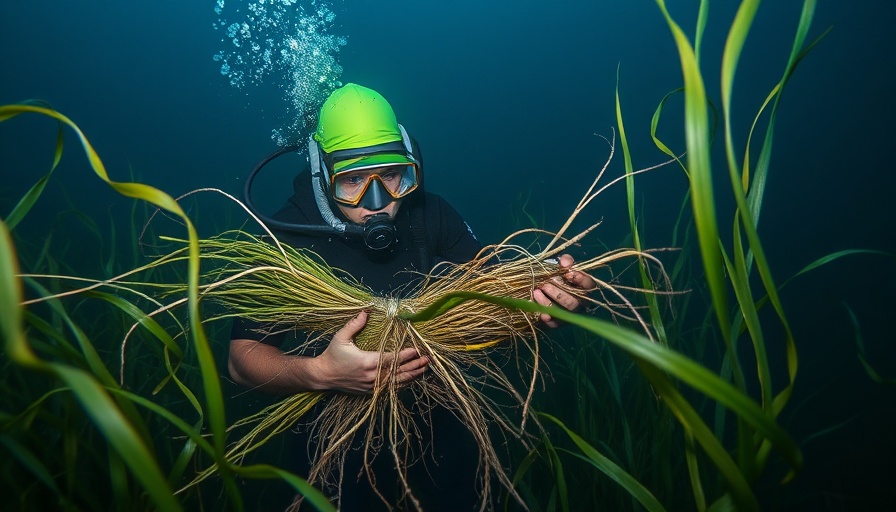
Oceans as the Key Player in Carbon Sequestration
The oceans, covering over 70% of our planet, are often touted as a crucial ally in combating climate change. With the increasing urgency to combat global warming, researchers and companies are proposing novel methods to harness the natural ability of oceans to absorb carbon dioxide (CO2). This concept is gaining traction, with numerous trials and projects underway globally, aiming to innovate how we capture and store atmospheric carbon using marine resources.
Exploring Innovative Solutions Under the Surface
One of the promising avenues for carbon capture in the ocean involves sinking various materials such as nutrient-rich rocks, crops waste, or even seaweed into marine environments. By providing ideal conditions for carbon uptake, these materials could effectively lock away carbon for centuries. This seismic shift in approach arises from the recognition that traditional land-based capture methods—like reforestation or underground carbon storage—can be limited by space, expense, and community impact. In contrast, the ocean appears nearly limitless, posing an exciting frontier for ambitious climate solutions.
How Ocean Chemistry Plays a Vital Role
The mechanics of carbon capture in the ocean hinge on a blend of chemistry and biology. Companies are exploring alkaline materials like magnesium oxide with the potential to transform CO2 into stable mineral compounds in seawater, stripping the gas from the air and locking it away safely. Projects, often led by oceanographic institutions, theorize that by mimicking natural processes, they can turn the ocean into a “carbon vacuum.” By injecting minerals that react favorably with CO2, it is theorized the oceans could absorb even more greenhouse gases effectively.
Growing Carbon-Sucking Organisms: The Power of Algae and Seagrass
Another form of ocean carbon capture involves cultivating seaweed and other marine plants. Much like terrestrial trees, these organisms absorb CO2 while growing and can be harvested sustainably. For instance, the endemic Posidonia Oceanica seagrasses found in the Mediterranean are being closely studied for their effective carbon sequestration capabilities. Efforts to develop seaweed farms not only serve as potential carbon sinks but could also stimulate new industries, offering job opportunities and economic growth while tackling climate issues.
The Financial Mechanics Behind the Ocean Initiatives
While the science and potential impacts of these ocean solutions are compelling, financial aspects also play a crucial role. Many startups in this domain have resorted to selling carbon credits—tokens that represent a ton of CO2 mitigation. This market is under intense scrutiny due to its unregulated nature, raising questions about the legitimacy and efficacy of such carbon offsetting strategies. As these ocean initiatives grow, stakeholders must remain vigilant to ensure that the market develops responsibly and transparently.
Ethical Concerns and Necessary Safeguards
Despite the optimism surrounding ocean carbon capture, there are notable dissenting voices cautioning against hasty implementation. Critics argue that the environmental consequences of deploying these strategies at scale remain largely unknown. There is growing concern that without protective regulations, these interventions could destabilize marine ecosystems, threatening biodiversity and altering natural oceanic processes. This necessitates a balanced approach, combining scientific rigor with cautious governance to ensure the protection of ocean health and integrity.
The Path Ahead: Balancing Innovation and Responsibility
The rush to capitalize on the ocean's potential for carbon sequestration underscores a critical challenge: how to harmonize innovation with responsibility and environmental stewardship. Stakeholders in the burgeoning ocean carbon capture industry must work towards establishing robust frameworks for ethical practice and transparent operations. As we stand at a pivotal crossroads, it's imperative to cultivate solutions that not only mitigate climate change but also ensure the long-term health of our oceans for generations to come.
Ocean carbon capture holds promise, but like any emerging technology, it demands scrutiny and thoughtful consideration. By fostering open dialogues between scientists, startups, policymakers, and communities, we can navigate the complexities of these ocean initiatives. Ultimately, the success of these efforts may well depend on our willingness to engage critically and collaboratively in shaping a sustainable future for our blue planet.
 Add Row
Add Row  Add
Add 




Write A Comment